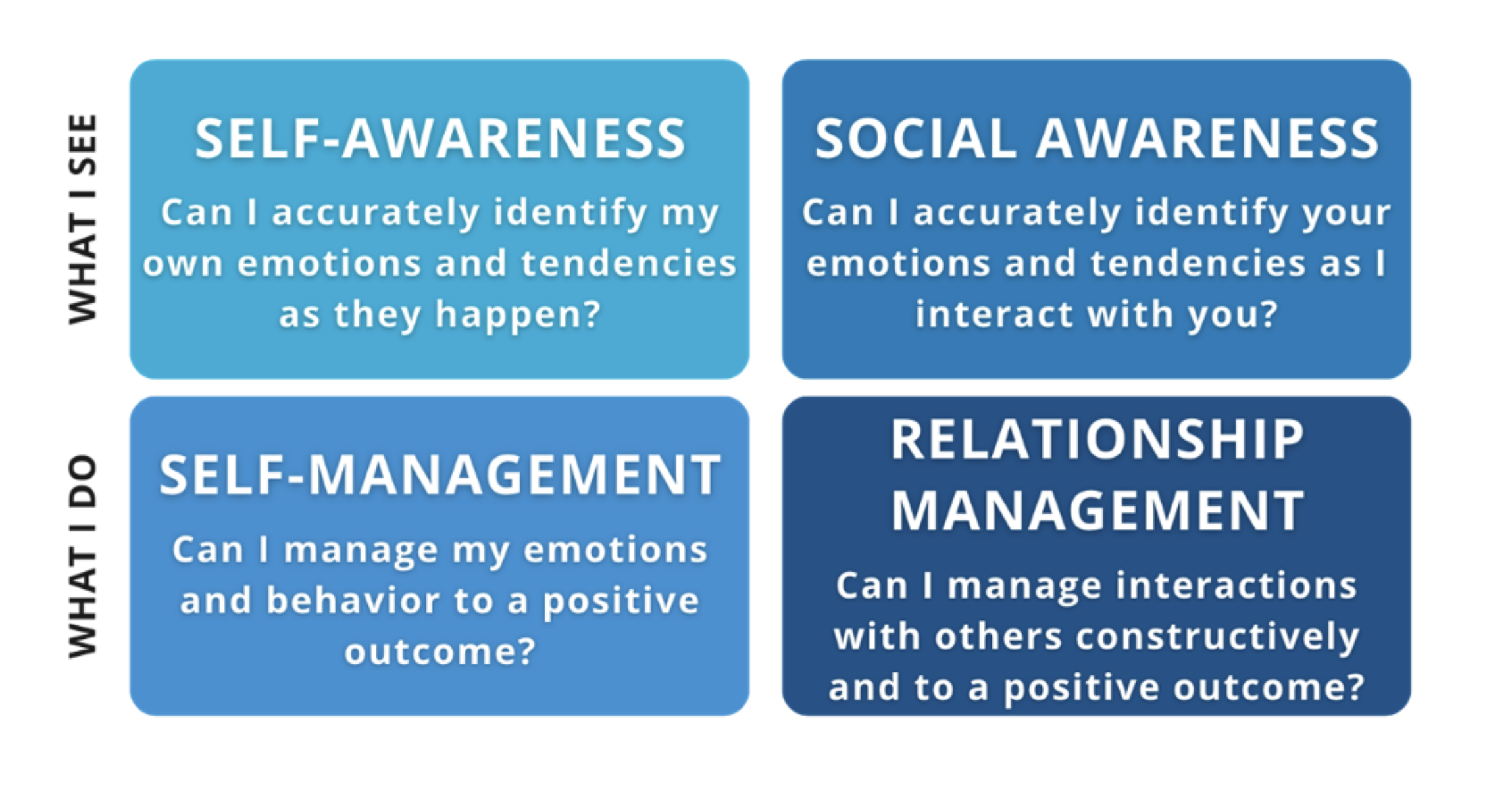
By Julia Behr, CVPM, CVBL, PPPC, CCFP - Director of Coaching Operations at Veterinary Growth Partners
A career in the veterinary industry is extremely rewarding, but it also comes with many emotional stressors. Veterinary professionals are faced with life-and-death situations with patients, emotional and sometimes irate clients, and team challenges including conflict amongst coworkers, or lack of clear expectations and support. Veterinary professionals must create strategies to help cope with stress and build resilience to improve health and well-being. Leveraging emotional intelligence skills is a powerful way to gain control and help remain calm when navigating through these usual challenges.
Prolonged exposure to stress can take a toll on your well-being and lead to negative health consequences and the following symptoms:
- Cognitive symptoms include the inability to concentrate, anxiety, and worry.
- Emotional symptoms include depression, unhappiness, and agitation.
- Physical symptoms include aches and pains, high blood pressure, and GI issues.
- Behavioral symptoms include eating more or less, sleep issues, and withdrawing.
As an industry, we need to support ourselves and each other by managing our stress more effectively to improve our well-being. Implementing emotional intelligence habits can help move us in a healthier direction.
Emotional intelligence is the ability to recognize and understand emotions in yourself and others, and the ability to use this awareness to manage your behaviors and relationships. It includes skills in self-awareness, self-management, empathy, and relationship management, and honing these skills can lead to better work success and more effective navigation of stressful situations. These skills allow you to remain calm and in control by understanding and regulating your emotions.
Here is a breakdown of the 4 domains of Emotional Intelligence:

Emotional intelligence helps to create a foundation to regulate your behavior and it improves your relationships with others. Individuals with high self-awareness have a deep understanding of their emotions and of their stress triggers and how they respond to them. This involves noticing when they feel stressed, anxious, or overwhelmed and effectively creating coping strategies to self-manage when these triggers happen. Individuals with high social awareness understand that their coworkers and supervisors also experience stress, and they are empathetic toward their situation. They actively listen to others when they are concerned or frustrated and offer support and understanding. Empathy helps build stronger relationships and social support networks, which are invaluable resources for coping with stress. Emotional intelligent people also manage conflict at work more effectively and have healthier communication skills.
Here are some habits and coping strategies that emotionally intelligent people utilize before, during, or after stressful situations that we can implement to hone our coping skills:
- Start a stress journal – A stress journal can help you identify your regular stressors at work and identify the way you deal with them. Think of a time you felt stressed and notate it in your journal. Keeping a daily log will help you to see patterns and common themes. Determine what caused you stress and the physical and emotional feelings you had. How did you respond? Think about what you can do next time to make yourself feel better and respond more appropriately.
- Be grateful – Begin and end your day with three things you are grateful for. Think about all the blessings you have in your life. Focus on aspects such as your health, relationships, opportunities, and the simple joys of everyday life. Gratitude helps you to focus on the present moment and can be highly effective at relieving stress and anxiety.
- Stay optimistic – Surround yourself with positive influences who uplift and inspire you. Try to view setbacks and obstacles as opportunities for growth and learning. Remind yourself of your ability to overcome obstacles. Take time to visualize your goals, aspirations, and dreams and create a vision board.
- Get active – Physical exercise is an anti-depressant and impacts cognitive ability by building brain cells through neuroplasticity, a rewiring of your brain. Take your dogs on a walk or hike in nature. Join a fitness club and have an accountability partner to help you stay on track. Keep a journal of how you feel after exercising to help motivate you to continue being active.
- Have good sleep hygiene – Good sleep helps you feel better and recharges you daily and 6-8 hours is ideal. Limit exposure to screens before bedtime. Create a sleep routine and a comfortable sleep environment. Utilize sleep meditations through apps like Calm, Balance, or Aura to help you fall or remain asleep.
- Set boundaries - Establish clear boundaries around work hours, communication channels, and personal time. Learning to say no to additional responsibilities or requests can help prevent feelings of overwhelm and exhaustion.
- Take regular breaks- Breaks help to address our personal needs and to keep us functioning at peak level. Schedule breaks into your schedule at work and ask for what you need from your coworkers.
- Focus on self-care: Practice mindfulness techniques to stay present and calm in stressful situations. Incorporate deep breathing exercises, meditation, or yoga, into your daily routine. Utilize instructors or apps to help you explore and implement these self-care habits.
- Reframe your self-talk – When you catch yourself engaging in negative self-talk, challenge those thoughts by asking yourself if there's evidence to support them. Replace negative self-talk with positive affirmations.
- Confront conflict constructively – Conflict is inevitable and how you deal with it can impact your stress levels. Remain calm by taking deep breaths to help regulate your emotions before addressing the issue. Actively listen and focus on the problem, not on the person. Brainstorm solutions together. Utilize a conflict cheat sheet to help role-play the conversation and keep you on track during the communication.
- Neutralize negative people – Redirect the conversation with a negative person by suggesting topics that shift away from the negative or provide a solution. If possible, limit your interactions with them or if that is not possible, set boundaries of what is acceptable and what is not.
- Utilize your support system – Surround yourself with the people that want the best for you and are there for you in your time of need. Utilize professional support such as a counselor, a life coach, or a fitness instructor.
- Focus on what you can control – Make a list to identify what you can control and strategize to accept what you cannot control. Instead of focusing on things outside of your control, try to set goals that you have the power to work on. Focus on solutions instead of problems.
In conclusion, a career in the veterinary industry demands emotional resilience to withstand its stressors. By embracing emotional intelligence, veterinary professionals can equip themselves with the tools necessary to manage stress effectively. Through leveraging habits and strategies rooted in emotional intelligence, individuals in the veterinary industry can forge paths toward greater resilience and fulfillment in their careers.
About the Author
References:
Bradberry, D. T. (2023). Emotional Intelligence Habits (1st ed., pp. 27-34). TalentSmartEQ*.
